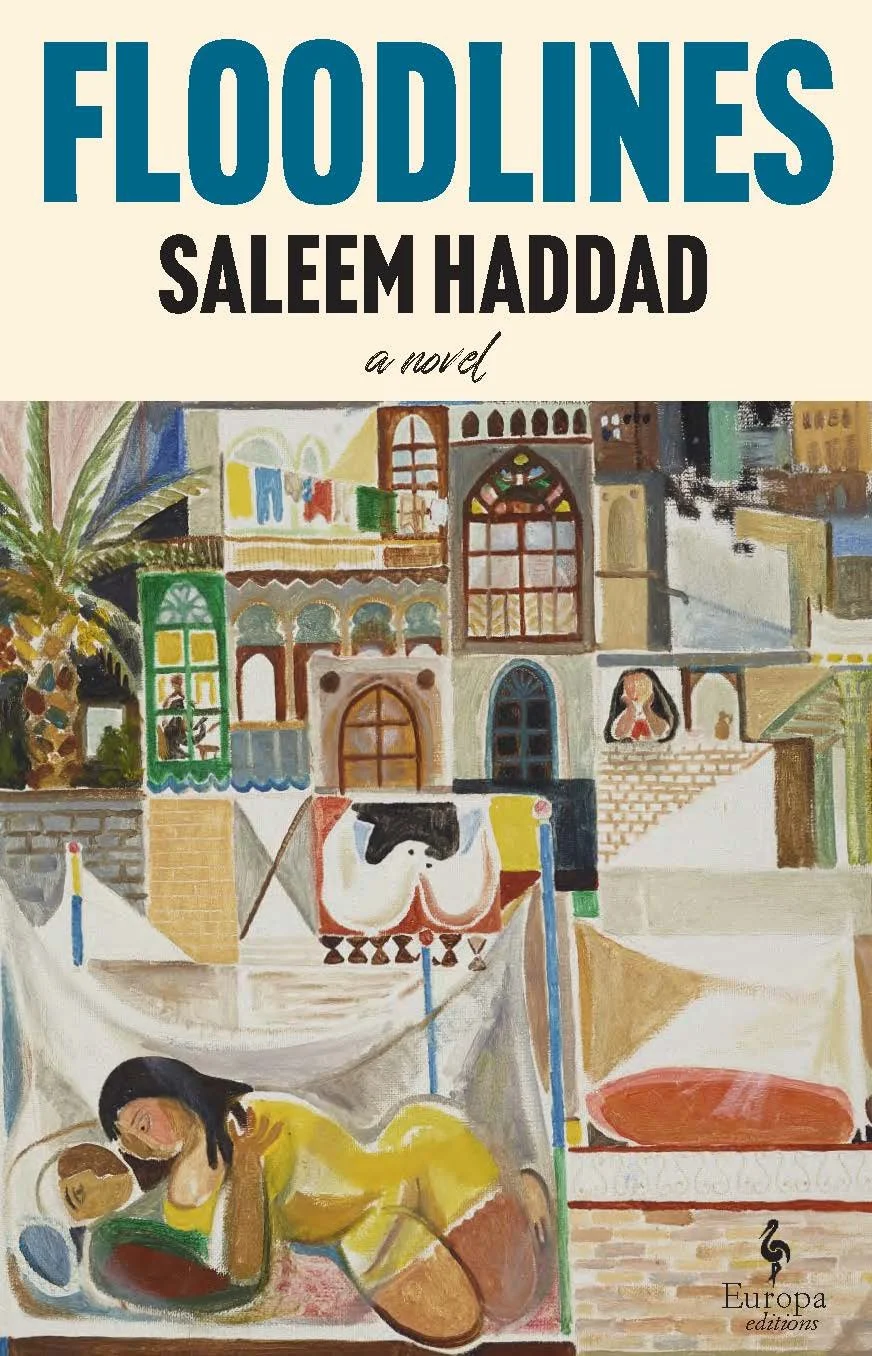Author of
Floodlines (Europa Editions, 2026)
Guapa (Other Press, 2016)
Saleem Haddad was born in Kuwait City in 1983 to a Lebanese-Palestinian father and an Iraqi-German mother, and educated in Jordan, Canada, and the United Kingdom. He has worked as an aid worker with Doctors Without Borders in Yemen, Syria, and Iraq, and has advised on humanitarian and peacebuilding issues throughout West Asia and North Africa. He is the author of the acclaimed debut Guapa, a 2017 Stonewall Honor Book and the winner of the 2017 Polari Prize. His 2019 directorial debut, Marco, was nominated for the 2019 Iris Prize for ‘Best British Short Film’, and is available to watch on YouTube. He is currently based in Lisbon.
Saleem Haddad
Books by Saleem
Floodlines (Europa Editions, 2026)
Saleem Haddad’s second novel Floodlines is a sweeping, multi-generational novel that traces the fractured bond between three estranged Iraqi-British sisters, each an artist in her own right, as they grapple with the legacies of war, exile, and family secrets. Set in 2014, as the Islamic State threatens to destroy the Iraq they once knew, the discovery of their late father's stolen paintings in their mother Bridget’s house ignites a fierce battle over the family's narrative. Beautiful Zainab, unforgiving Mediha, and queer, headstrong Ishtar each cling to opposing versions of the past, and this discovery triggers the resurfacing of long-buried memories, which will force each of them to confront the personal and political betrayals that tore their family apart.
PRAISE
“Haddad’s writing is a searing meditation on hope. Floodlines is beautifully crafted, and breathtaking in scope and reach. It is a book that mourns Iraq and all the senseless violence its people and lands have been subjected to while celebrating its art and heritage, richness and commitment to life.“—Tareq Baconi, author of Fire in Every Direction
“Haddad writes movingly about what we inherit, and places art at the heart of his exploration into how the tragedy of a country and the tragedy of a family live on the same canvas.”--Michael Langan, author of Shadow Is A Colour As Light Is
Floodlines manages to grip and engage even as it explodes moral and intellectual complacencies. In asking what it means to make art, it manages to be cinematic and essayistic in the same breath. Above all, it manages to fuse the intimate subjectivities of disinheritance and displacement with unfolding history. An epic vindication. — Youssef Rakha, author of The Dissenters
“Haddad writes with the precision of a historian and the heart of a poet. Floodlines is a haunting, incandescent novel, a story of art and aftermath, of queerness and quiet revolution, and an excavation of family, memory, and the political ruptures that echo across generations. With fierce tenderness and astonishing power, Haddad confirms himself as one of our most vital storytellers. A stunning, necessary book.” –Seth Insua, author of Human, Animal
“Tracing the shifting territories of meaning forged through the art and narratives of witness, Floodlines is a sophisticated exploration of inheritance, identity, and the politics of intimacy, navigating the delicate negotiations between revelation and concealment. Haddad’s depiction of the search for home, both spiritual and physical, one shaped by love, rage, and longing, is a compelling and resonant novel for our moment.”--Peter Scalpello, author of Limbic
Guapa (Other Press, 2016)
Winner of the Polari First Book Prize 2017
A 2017 Stonewall Honor Book
An Amazon Best Book of the Month
An Amazon Editors’ Pick
Set over the course of twenty-four hours, Guapa follows Rasa, a gay man living in an unnamed Arab country, as he tries to carve out a life for himself in the midst of political and social upheaval. Rasa spends his days translating for Western journalists and pining for the nights when he can sneak his lover, Taymour, into his room. One night Rasa's grandmother — the woman who raised him — catches them in bed together. The following day Rasa is consumed by the search for his best friend Maj, a fiery activist and drag queen star of the underground bar, Guapa, who has been arrested by the police. Ashamed to go home and face his grandmother, and reeling from the potential loss of the three most important people in his life, Rasa roams the city’s slums and prisons, the lavish weddings of the country’s elite, and the bars where outcasts and intellectuals drink to a long-lost revolution. Each new encounter leads him closer to confronting his own identity, as he revisits his childhood and probes the secrets that haunt his family. As Rasa confronts the simultaneous collapse of political hope and his closest personal relationships, he is forced to discover the roots of his alienation and try to re-emerge into a society that may never accept him.
PRAISE
“Freewheeling and incendiary.” ―London Review of Books
“This immensely readable novel is fluent, passionate and emotionally honest. Equally astute in its analysis of Arab and American mores, the book’s characters are nuanced and dynamic; it gives fresh life to the maxim 'the personal is political'.” ―The Guardian
"A vibrant, wrenching début novel...sensuous and caustic, full of smoke and blood.” ―The New Yorker
“Guapa offers an intimate, complex portrait of gay life in the Arab world, a subject rarely explored in fiction.” ―Gay Times
“A remarkable debut.” ―Huffington Post
“Guapa sets Haddad up as a literary voice capable of narrating untold stories of the modern gay experience, from one of the most complicated parts of the world.” ―Attitude Magazine
“The topic of gay life in the Arab world is richly complex, and Haddad's cinematic, evocative prose rises to meet the sensitive subject matter.” ―Publisher’s Weekly
“When the revolutions happened, I felt a very strong urge to write a story like this, partly out of this sense that I was still struggling to find a space for my voice because I was so mixed up. So I put everything into this novel and it was a relief.” ―The Guardian (Interview)



